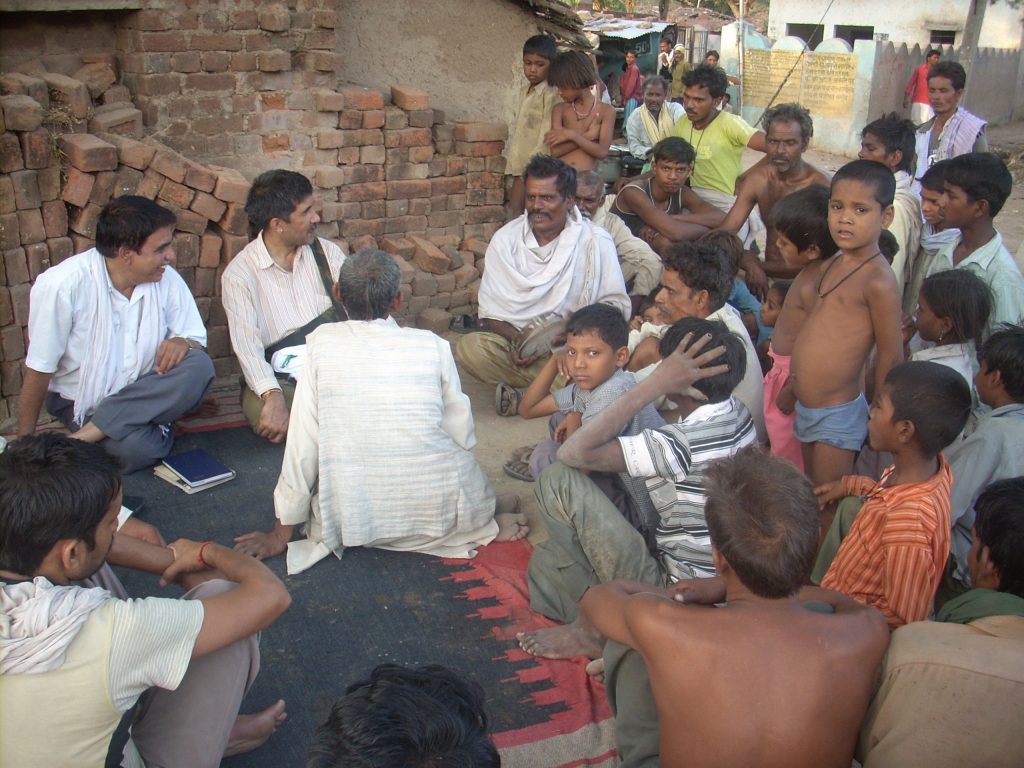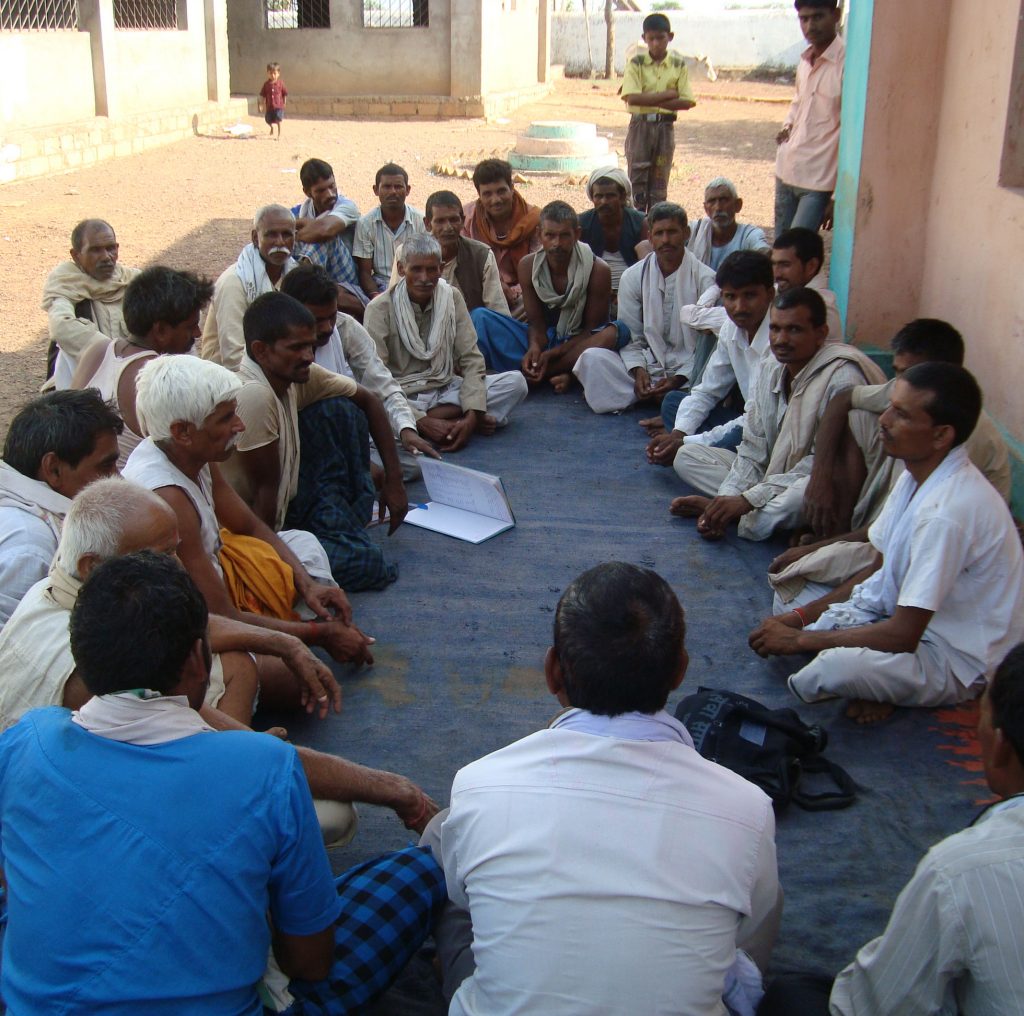REBUILDING A CONFLICT-FREE SOCIETY
Ramrajya as envisaged by Mahatma Gandhi can only be achieved when there is freedom from crime and fear. For a conflict-free society and nation we would have to begin from our villages as India lives in her villages. The first step required to make these villages prosperous and self-reliant would be to help free them from all disputes.
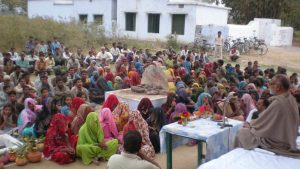
Mahatma Gandhi always had the feeling that the dream of an ideal village cannot be fulfilled until it is free from all kinds of ills and crimes. He once remarked — “India lives in her villages but unfortunately, our rural India, the real India, is inflicted with poverty and social squalor”. “We can improve the condition of India only when we improve the conditions in our villages”. “If villages thrive, we all would thrive”. The great philosopher, Pandit Deendayal Upadhyaya, also stressed many a time that no society can prosper so long as it is entangled in disputes, litigations, etc. However, this area – of making society conflict-free — has remained neglected in all the social work being done by thousands of NGOs working for rural development throughout the country.
Deendayal Research Institute (DRI), realized that this indeed should be the first task in the field of rural development. Because the Institute believes that only a mind free from all encumbrances can think of development. And as it believes in the philosophy of Integral Humanism, the Institute is of the firm belief that only a society not afflicted by social hindrances can progress. In the year 2002, the Institute took upon itself the task of making 500 villages in its area of operation dispute-free by the turn of the decade. And what it has achieved in 80 villages in the first phase so far has been encouraging.
Till date, more than 80 percent of the disputes have been resolved with mutual consent with the motivation of the Samaj Shilpi Dampattis (Social Architect Couples) who are deputed by the Institute in these villages to help them become self-reliant. The target is to make these 80 villages litigation-free by August 15th this year. And the work is running ahead of its schedule.
But first, the genesis of the problem: Why rural India is afflicted with so much litigation. Nanaji Deshmukh, the visionary behind this unique concept, feels that majority of the crime in villages has erupted from the growing consumerist culture that we have adopted from the West. Consumerism leads to competition and competition leads to enmity and then to litigation. Our villagers too, falling prey to this culture, started migrating to cities in search of more wealth and got involved in all kinds of criminal activities.
There can only be a change in above situation when there is a change in attitudes, and the greed for wealth diminishes. As the cities are result of the consumerism culture, it is not easy to change them instantly. However, it is easy to change the attitude of villagers, provided we make them self-reliant and stop their migration to the cities. The Samaj Shilpi Dampattis (SSDs) work on the premise that every dispute can be solved if the villagers, particularly the womenfolk are explained the ill-effects of litigation on their progress. In many cases, it takes weeks and months to make them understand as to how important it is to live without any encumbrances.
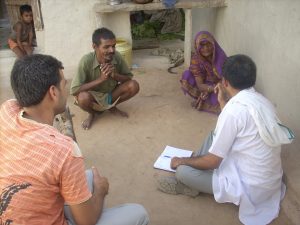 The ‘modus operandi’ adopted to implement this concept was to make the villagers think that freedom from litigation would be a panacea for them against all ills, and happiness would come, bringing enthusiasm with it. Self-reliance and a cooperative way with the realism of coexistence would help their village to progress. To be on the path of development with voluntary realization — for their own rights and duties vis-à-vis the rights and duties of others — would be necessary. This motivation developed an enthusiasm amongst the people of the villages, and age-old cases for which they made rounds of the courts came to an end with good gestures by mutual agreement. Thus, gradually a village becomes a litigation free village.
The ‘modus operandi’ adopted to implement this concept was to make the villagers think that freedom from litigation would be a panacea for them against all ills, and happiness would come, bringing enthusiasm with it. Self-reliance and a cooperative way with the realism of coexistence would help their village to progress. To be on the path of development with voluntary realization — for their own rights and duties vis-à-vis the rights and duties of others — would be necessary. This motivation developed an enthusiasm amongst the people of the villages, and age-old cases for which they made rounds of the courts came to an end with good gestures by mutual agreement. Thus, gradually a village becomes a litigation free village.
Says Nanaji, “There is poverty; unemployment; homelessness; landless labourers; an acute water scarcity; lack of roads, electricity and sanitation; communal divisions; political and caste-based polarisation; broken families; administrative corruption; communicable diseases; chronic health hazards; and many other problems that are responsible for the sufferings of the people in the villages”. With pain, he adds, “Crime is the byproduct of these maladies. If we are able to address these socio-economic and cultural concerns, we are confident that we’ll be able to control criminal offences and will gradually be able to do away with criminal activities in the village.”
SSDs go to villagers with a positive attitude towards life. Villagers understand the language of positivism more easily than that of negativism. Freedom from crime means freedom from many things –
- litigation,
- hatred,
- unemployment,
- communicable diseases,
- illiteracy,
- poverty,
- drug abuse,
- vandalism,
- domestic violence,
- sexual offences,
- gender-based discrimination,
- mutual distrust,
- child labour,
- desertion of the elderly,
- environmental degradation and pollution,
- mental distress, and
- It means total development.
It means the welfare of the people and the community. It means social tranquility and cooperation. It means culture and civilisation. It is the highest mode of life one can ever attain.
What is important here is a change in the attitude and aptitude of the people, as it is they who fight. To build trust in the minds of the people, and through constant contact and interaction with the person or family, to create in them an attitude that seeks peaceful solutions rather than court verdicts. This is the qualitative change that needs to be introduced in society through motivation.
Almost all kinds of crimes can be resolved once the attitude changes. If we can inculcate a feeling of unity, harmony, brotherhood and cooperation amongst the people there would be no cause for litigation. A litigation-free village means a community where disputes are resolved by the people themselves, freeing them from going to a police station or a court of law.
According to Nanaji, in ancient times, when there were no police, courts and lawyers, people used to have quarrels and fight, but they used to solve such discords amicably through peaceful negotiations and mediation. There were elders in society who were part of the community, and they mediated between the parties involved. There was neither bribery nor favouritism. There were no expenses involved and no delay. If people are capable of committing wrongs, they are also capable of resolving such mistakes. They should use their potential creatively and for the good of the entire community. The whole process is participatory, ensuring the involvement and cooperation of the parties concerned.
SSDs have come to the conclusion that the women can play a more important role in solving several disputes, as she is the worst sufferer in any dispute. Disputes arising within the family can be solved with her help as she is the axis of the family and she can influence several decisions. She can also motivate the male members of the family to solve other disputes by mutual discussions instead of going to courts and police.
A survey done by DRI in some villages out of the total 80 villages to find the status of disputes in villages near Chitrakoot revealed that only one village, Khodari, had no disputes. Almost all villages had some or the other disputes and majority of the disputes were related to revenue, faujdari and others were petty disputes related to family and neighbours. However, after DRI began its work in these villages with the help of the SSD couples, most of the villages within the Self Reliance Campaign were litigation free.
Nanaji said, “DRI is always there to help villagers achieve happiness and open new vistas of development. But our workers can only be motivators and facilitators. The real urge lies with the villagers themselves. If they want it, they can achieve it. Nobody can stop them.”
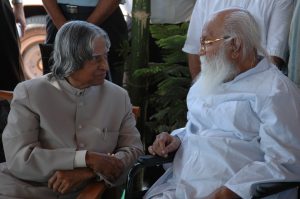
EXTRACT OF PRESIDENT’S ADDRESS AT THE GOLDEN JUBILEE YEAR OF THE HIGH COURT OF MADHYA PRADESH, JABALPUR,
MADHYA PRADESH
ON 12-10-2006
“In the rural judicial system, justice is always with the truth. A system of dispute resolution I saw in Chitrakoot in Madhya Pradesh, where I met Shri Nana Deshmukhji (Age 90) and his team members belonging to Deendayal Research Institute (DRI). DRI is a unique institution developing and implementing a village development model which is most suited for India. Apart from all these development activities, the institute is facilitating a cohesive conflict free society. As a result of this, I understand that the eighty villages around Chitrakoot are almost litigation free. The villagers have unanimously decided that no dispute will find its way to court. The differences will be sorted out amicably in the village itself. The reason given by Nana Deshmukhji is that if the people fight among each other, they have no time for development. I consider that the extension of this type of model throughout the state may result in the development of a peaceful society in Madhya Pradesh. Both Bar Association and the Judiciary may consider implementing the system.”

